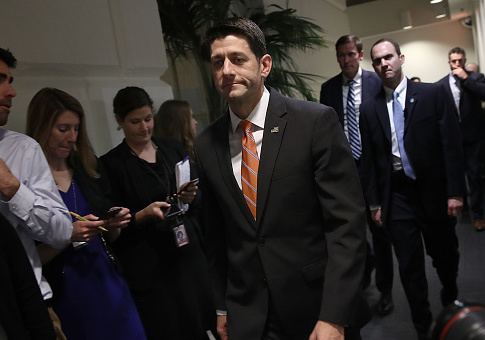The American Health Care Act, Republicans' replacement for the Affordable Care Act, has been amended and is now estimated to reduce the deficit by $150 billion from 2017 to 2026, according to the Congressional Budget Office.
On March 20, the House Rules Committee amended the legislation and many were calling for the budget office to rescore the bill, taking these changes into account. The amendments accelerated the repeal of taxes, gave more power to the states, and gave additional support for older Americans.
The original budget office scoring released on March 13 projected that the bill would reduce the deficit by $337 billion from 2017 to 2026, increase the number of uninsured by 14 million people, and reduce premiums by 10 percent by 2026.
The new amendments cause the legislation to lose savings but will slow the decline in Medicaid coverage from the previous estimate. The projection in decline of premiums has remained the same.
"CBO estimates that enacting H.R. 1628, with the proposed amendments, would save $186 billion less over that period," the budget office said. "That reduction in savings stems primarily from changes to H.R. 1628 that modify provisions affecting the Internal Revenue Code and the Medicaid program."
"The decline in Medicaid coverage after 2020 would be smaller than in the previous estimate, mainly because of states' responses to the faster growth in the per capita allotments for aged, blind, and disabled enrollees—but other changes in Medicaid would offset some of those effects," the budget office said.
On Thursday night, following meetings between the White House, Tuesday Group members, and the Freedom Caucus, Speaker Paul Ryan (R., Wis.) announced that the bill was amended again to include a transfer of control to states to define essential health benefits, an additional $15 billion to the Patient and State Stability Fund, and a delay of the repeal of the Medicare Tax increase. These changes were not included in the budget office’s most recent scoring.
The Committee for a Responsible Federal Budget, a nonpartisan, nonprofit organization, said that changes to the bill have the potential to increase insurance coverage.
"In our assessment, the legislation would likely produce modest increases in economic growth under CBO's model," the committee said.
"Importantly, CBO's estimates do not incorporate future changes that could be made to insurance market rules, either by regulation, further legislation, or further amendments to this bill that are still being discussed," the group said. "Such changes have the potential to increase total insurance coverage relative to the AHCA. However, increasing coverage would also likely increase the total cost."
